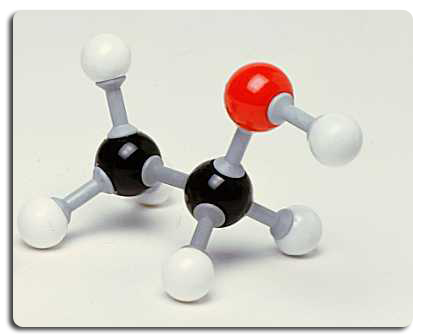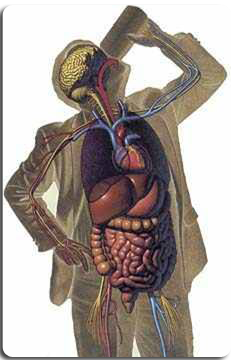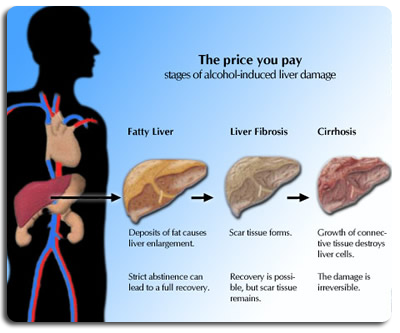 Chemically speaking, the alcohol molecule has the following formula:
Chemically speaking, the alcohol molecule has the following formula:
CH3 – CH2 - OH
EFFECTS OF ALCOHOL ON THE HUMAN BODY
What is ALCOHOL?
 Chemically speaking, the alcohol molecule has the following formula:
Chemically speaking, the alcohol molecule has the following formula:
CH3 – CH2 - OH
Alcohol is a powerful drug, with potential addiction, which can affect our health. Longtime consumption of alcohol can badly affect the liver, brain, nervous system and heart. Alcohol decreases the hormone level, reduces sexual ability both at men and women. Alcohol influences the capacity to take good decisions, to think and to control impulses.
Effects of alcohol on the body

Alcohol, apart from food, isnít digested in the stomach or guts. When alcohol reaches the stomach, a part of it gets into the stomachís cells and then in the sanguine system. The rest of it gets into the thin intestine and then directly into the blood. Alcohol can affect the tissues that protect the stomach and larynx. Even in small quantities, alcohol increases the secretion of digestive liquids from the stomach and creates a hunger sensation. Constant irritation of the stomachís wrapping can cause gastritis: chronic inflammation of mucous membrane. Food can slow down the absorption of alcohol in blood by almost 50%. Fat food, besides proteins, which can be found in milk and cheese, can protect the drinker to intoxicate soon. The intoxication level is determined by the quantity of alcohol consumed a single time and also the speed of consumption. Slow consumption and in small quantities allows the liver to oxidize the alcohol a lot more efficient that if it was consumed all at once. The end result will be a lower level of intoxication.
Alcohol must be decomposed by the liver in CO2 and H2O before exiting the body. The liver canít decompose once large quantities. The rest of alcohol circulates through the blood until the liver will be able to decompose it. When the liver weakens, symptoms in the digestive tube and in the circulatory system will appear. Cirrhosis is a liver deterioration which destroys healthy tissues and leaves only fat and fibrous tissues. Cirrhosis is caused by excessive alcohol consumption over a long period of time.
As alcohol circulates through blood, he reaches all the parts of the body. In a few minutes it reaches the brain. Alcohol is sedative and depressive, it slows down the brainís activity. Alcohol doesnít allow stocking and withdrawing information into the memory, it can produce hallucinations and even apoplexy.

Alcohol can deteriorate both vision and hearing. Taste, smell and tactile perception can also be affected. Because all the muscles are under the brainís control, this control is affected by even small quantities of alcohol. This deterioration can cause in time lose of coordination and response.
The weight of the body is an important factor in the effect of alcohol. The liver oxidizes alcohol which means that it chemically decomposes it. A larger person will support much easier the effects of alcohol than a thinner one. The intoxication effect appears when alcohol reaches the brain and canít be oxidized by the liver. Keep in mind that alcohol isnít digested like food. It is absorbed by the blood, a part of the stomach and a part by the thin intestine.
The strength of an alcoholic drink determines its effects on the body. The ďstrengthĒ indicates the concentration of alcohol in the drink. Alcohol content:
The level of alcohol in blood represents the quantity of alcohol transported by the blood to the brain which determines the intoxication level.
A level of 0,01%-0,02% alcohol in blood doesnít have a significant effect on the body; 0,1%-0,15% causes more worse symptoms such as deterioration of sight, hearing, movement. At a level of 0,1%-0,15% it is very dangerous driving a car. At 0,2% appear clear signs of being drunk: difficulties of speaking, of walking. Concentrations over 0,4% cause coma. Those between 0,6% and 0,7% cause death.
As you can see, alcohol has a lot of effects on the body. Some are of short term, other of a long period. Both can be though disastrous.
Short term effects of alcohol:
- Slowed responses to the environment
- Decreased coordination
- Decreased ability to think clearly
- Altering memory
- Vomiting
- View disorders
- Increased risk of accidents
- Difficult to walk or to stand up
- Loss of consciousness
- Coma
- Death
Long term effects of alcohol:
- Alcoholism
- Memory loss
- Liver cirrhosis
- Brain damage
- Heart disease
- Malnutrition
- Shortened life
- Death by accident (the car)
- Death by other accidents.